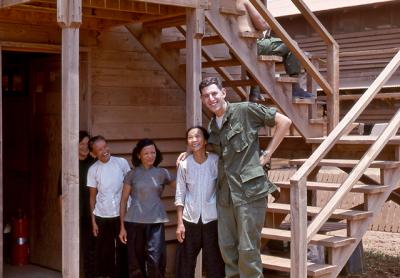Christmas in Vietnam

Holiday season in a war zone: 1968. Fifty years ago this month.
I was one of a half-million American men and women stationed in Vietnam, the majority of us involved in combat support operations. I had arrived in March that year, six weeks after the major Tet offensive, a junior officer assigned to Army headquarters at Long Binh, some 20 miles east of Saigon. It was the largest military installation outside the United States — a post larger than Manhattan Island and home to more than 50,000 men and women.
Christmas in a war zone is bittersweet. Spirits lift; feelings of optimism and friendship are welcomed and embraced. At the same time, there’s the constant realization that you’re in a combat zone and with it an ineffable, terrible loneliness. We were separated from those we loved and detached from the daily events in American life that would make 1968 the most tumultuous year in recent American history. We were at war. And, while the war was often the focus of news, much else played — and preyed — upon our emotions.
On March 31, two weeks after arriving, I listened to a live radio broadcast as President Johnson unexpectedly declared, “I shall not seek, and I will not accept, the nomination of my party as your president.” Did this mean, somehow, that peace was nearer at hand?
Five days later I would learn, with shock and sadness, anger and pain, of Dr. Martin Luther King Jr.’s assassination. In May I would feel frustration at the slow beginnings of the Paris peace talks — talks that ultimately would last almost seven years. And somehow things got worse: In June, Bobby Kennedy was assassinated.
That summer, I read about the political conventions in Miami and Chicago, of Yippies and hippies, and of more numbing violence. If 1967 embraced the “Summer of Love,” what should we have called the summer of ’68?
Hope was renewed that fall when President Johnson declared a halt to the bombing of North Vietnam, but that hope was replaced by disappointment when Richard Nixon, not Hubert Humphrey, was elected president.
And then it was Christmastime.
Bob Hope, Ann-Margret, and Rosey Grier came to our base to entertain us. So did the Rev. Billy Graham to lead us in prayer. Thousands attended both events in an open-air amphitheater, but what I remember most were the surrounding hills ringed with guards, weapons at the ready for an attack that never came.
On Christmas Eve the people with whom I worked got together and set up an artificial tree with tinsel, ornaments, and paper cutouts. We sang carols and exchanged inexpensive gifts. And our first sergeant managed to come up with trays that overflowed with cold cuts, salads, fresh fruit, bread and rolls, and cake.
Christmas Day itself was quiet. Wherever possible throughout Vietnam, it was a day of rest. Worship services were held, and the mess halls served a dinner from half a world away: turkey, cornbread stuffing, cranberry sauce, sweet potatoes, and apple pie. The Red Cross passed out gift packages put together by volunteers back in the States.
For those few days it was a time of peace.
Many years have passed. I often think back. But the holiday image I carry is not of a sun-baked Army base, visiting V.I.P.s, or mess-hall tables in a combat zone incongruously laden with food. Nor is it the image of lonely servicemen, or a sad people whose land was being systematically destroyed. It is, instead, an image from late Christmas Eve. On that night, when one more religious than I might have sought a star to lead the way, on that night I stood outside my bunker and looked up toward the moon.
It was the era of our earliest Apollo spaceflights; the moon landing would not come until the following summer. But I knew from news reports that three men were silently, peacefully circling the moon — the first men ever to travel so far into space — and that three days later those same men would splash down in the Pacific.
And I was overwhelmed by the realization that it was easier to send those three men to the moon and get them back safely than it was for me to get home, for my fellow servicemen and women to get home, for the war to end and for people to somehow live at peace.
It is now 50 years later. Half a century.
In 1968 we were engaged in what we called the Vietnam War and the Vietnamese called the American War, a war we could never win, a war in which 58,000 Americans and more than three million Vietnamese would lose their lives.
Today, sadly, it too often feels we are fighting a different war, a war within our own country, a war on civility and decency, on compassion and inclusion, on understanding and tolerance.
Have we learned any lessons from the past? Is there an end to the bigotry and hate and violence we do upon ourselves?
At this season of peace, at this time of peace, these remain sobering thoughts.
Jim Lubetkin is a retired nonprofit public affairs and public relations executive. He lives in Amagansett. An earlier form of this article appeared as an op-ed in The Christian Science Monitor in 1987 and was chosen by Columbia University’s Graduate School of Journalism at its 100th anniversary as one of 100 great stories written by its alumni.
